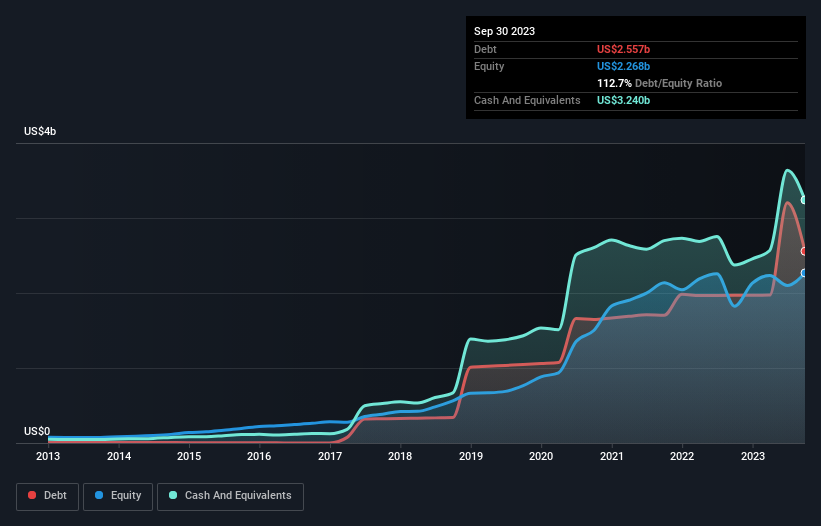- United States
- /
- Medical Equipment
- /
- NasdaqGS:DXCM
DexCom (NASDAQ:DXCM) Seems To Use Debt Rather Sparingly

Warren Buffett famously said, 'Volatility is far from synonymous with risk.' It's only natural to consider a company's balance sheet when you examine how risky it is, since debt is often involved when a business collapses. We note that DexCom, Inc. (NASDAQ:DXCM) does have debt on its balance sheet. But the real question is whether this debt is making the company risky.
When Is Debt Dangerous?
Debt assists a business until the business has trouble paying it off, either with new capital or with free cash flow. Part and parcel of capitalism is the process of 'creative destruction' where failed businesses are mercilessly liquidated by their bankers. However, a more common (but still painful) scenario is that it has to raise new equity capital at a low price, thus permanently diluting shareholders. Having said that, the most common situation is where a company manages its debt reasonably well - and to its own advantage. When we think about a company's use of debt, we first look at cash and debt together.
View our latest analysis for DexCom
What Is DexCom's Net Debt?
As you can see below, at the end of September 2023, DexCom had US$2.56b of debt, up from US$1.97b a year ago. Click the image for more detail. But on the other hand it also has US$3.24b in cash, leading to a US$683.7m net cash position.

A Look At DexCom's Liabilities
According to the last reported balance sheet, DexCom had liabilities of US$1.68b due within 12 months, and liabilities of US$2.65b due beyond 12 months. On the other hand, it had cash of US$3.24b and US$788.5m worth of receivables due within a year. So it has liabilities totalling US$299.5m more than its cash and near-term receivables, combined.
Having regard to DexCom's size, it seems that its liquid assets are well balanced with its total liabilities. So it's very unlikely that the US$47.4b company is short on cash, but still worth keeping an eye on the balance sheet. Despite its noteworthy liabilities, DexCom boasts net cash, so it's fair to say it does not have a heavy debt load!
In addition to that, we're happy to report that DexCom has boosted its EBIT by 90%, thus reducing the spectre of future debt repayments. There's no doubt that we learn most about debt from the balance sheet. But ultimately the future profitability of the business will decide if DexCom can strengthen its balance sheet over time. So if you're focused on the future you can check out this free report showing analyst profit forecasts.
Finally, while the tax-man may adore accounting profits, lenders only accept cold hard cash. DexCom may have net cash on the balance sheet, but it is still interesting to look at how well the business converts its earnings before interest and tax (EBIT) to free cash flow, because that will influence both its need for, and its capacity to manage debt. Over the most recent three years, DexCom recorded free cash flow worth 79% of its EBIT, which is around normal, given free cash flow excludes interest and tax. This free cash flow puts the company in a good position to pay down debt, when appropriate.
Summing Up
We could understand if investors are concerned about DexCom's liabilities, but we can be reassured by the fact it has has net cash of US$683.7m. And we liked the look of last year's 90% year-on-year EBIT growth. So is DexCom's debt a risk? It doesn't seem so to us. Another factor that would give us confidence in DexCom would be if insiders have been buying shares: if you're conscious of that signal too, you can find out instantly by clicking this link.
Of course, if you're the type of investor who prefers buying stocks without the burden of debt, then don't hesitate to discover our exclusive list of net cash growth stocks, today.
New: Manage All Your Stock Portfolios in One Place
We've created the ultimate portfolio companion for stock investors, and it's free.
• Connect an unlimited number of Portfolios and see your total in one currency
• Be alerted to new Warning Signs or Risks via email or mobile
• Track the Fair Value of your stocks
Have feedback on this article? Concerned about the content? Get in touch with us directly. Alternatively, email editorial-team (at) simplywallst.com.
This article by Simply Wall St is general in nature. We provide commentary based on historical data and analyst forecasts only using an unbiased methodology and our articles are not intended to be financial advice. It does not constitute a recommendation to buy or sell any stock, and does not take account of your objectives, or your financial situation. We aim to bring you long-term focused analysis driven by fundamental data. Note that our analysis may not factor in the latest price-sensitive company announcements or qualitative material. Simply Wall St has no position in any stocks mentioned.
About NasdaqGS:DXCM
DexCom
A medical device company, focuses on the design, development, and commercialization of continuous glucose monitoring (CGM) systems in the United States and internationally.
Flawless balance sheet with reasonable growth potential.
Similar Companies
Market Insights
Community Narratives




